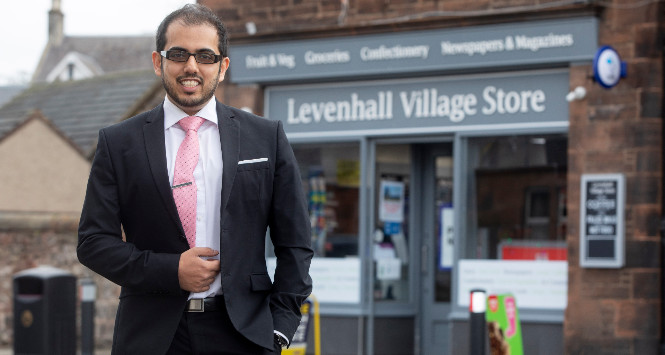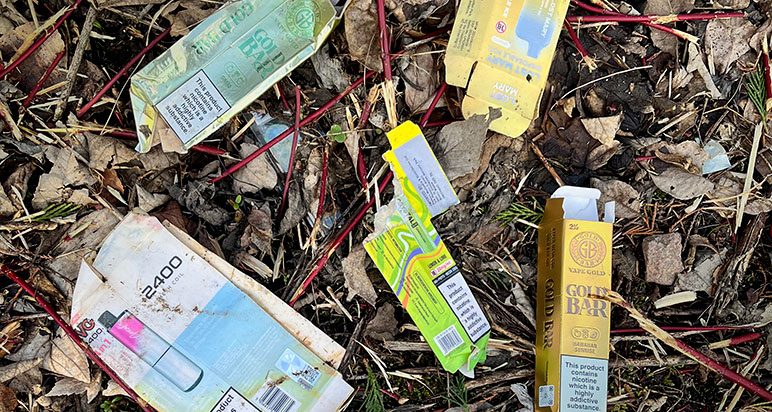The ban on single-use vapes is seemingly a dark cloud looming over the sector, with some retailers making thousands of pounds from them every week, but is it going to be as bad as you think?
By Liz Wells
Disposable vapes are the most widely used tobacco harm reduction alternative in the UK, with more than half of adult vapers preferring these devices owing to their convenience and affordability.
Therefore, it’s not unreasonable to think that the upcoming ban on disposable vapes will have a dramatic impact on retailers, but is that really the case?
The ban on the sale and supply of single-use vapes in Scotland is due to come into effect on 1 April 2025, under proposed legislation published at the end of February. From that date, it will be an offence for a person or business, to supply, offer to supply, or have in their possession for supply, single-use vapes. Those found in breach will be subject to a summary conviction of up to two years and/or a fine.
The move takes forward the recommendation to ban single-use vapes from a consultation on ‘Creating a Smokefree Generation and Tackling Youth Vaping,’ which ran across Scotland, England, Wales and Northern Ireland last year.
Circular Economy Minister Lorna Slater said: “The public consultation demonstrated that there is strong support for tougher action on vaping. From causing fires in waste facilities to more than 26 million disposable vapes being consumed and thrown away in Scotland in the past year, single-use vapes are a threat to our environment as well as to our public health.”
Under pressure
Despite the ban helping to tackle littering, other environmental issues, and underage sales, many fear that it will put stores under even more pressure.
SGF Chief Executive, Pete Cheema, explains: “The convenience retail sector is under a huge amount of pressure. Not least from the cost of energy, higher inflation and interest rates and the conveyor belt of regulation government is piling onto small businesses. From restrictions to promotion of alcohol and of foods high in fat, salt and sugar, and Minimum Unit Pricing, to reduced business rates relief and the generational ban.”
He believes many retailers are already struggling to make ends meet, as are their customers, and that the ban on single-use vapes will add to the challenging economic circumstances retailers find themselves in.
“There is simply no room for the sector to absorb these additional costs and unfortunately that means they will most likely be passed onto customers. Exasperating both inflation and the cost-of-living crisis,” Cheema adds.
This view is supported by NFRN National Vice-President and Blantyre retailer Mo Razzaq. “Costs are rising and small retailers are absorbing them so far, but there is only so much that a small business can take,” he says.
Customer habits
Retailers will be under more pressure if their customers fail to migrate from disposable to rechargeable vapes.
However, Naeem Khaliq, Head of Symbol at United Wholesale (Scotland), is confident that vapers will make the switch, so much so that he’s already purchased lots of stock.
“It doesn’t need much upselling, so not much impact on retailers,” he says.

Saleem Sadiq, owner of Spar Renfrew, agrees: “I’m fairly confident vapers will migrate, especially with tobacco prices on the up.”
Meanwhile, SGF boss Cheema thinks its “not clear” how customer habits will change after the ban, but predicts there will be “some panic buying” beforehand and “a surge in illicit trade” after.
He says: “Undoubtedly some people will automatically switch to refillables or other alternatives, and retailers will continue to offer that service.”
East Lothian retailer Ferhan Ashiq warns that if customers do not migrate in substantial numbers, then retailers will be forced to raise prices “substantially” to pay for all the costs, which will have “a large inflationary impact”.
Ferhan adds: “We should note, though, that there is only so many price rises that a consumer will be prepared to take and thus some store owners will be in a position where they cannot pay their basic bills and will have to close.”
Challenges
It’s widely believed that customers unwilling to migrate from disposables to rechargeable vapes will turn to the illicit market for their fix.
Saleem Sadiq believes there will “definitely” be an increase in illegal vapers. He says illicit is “already huge” because there are not enough police or trading standards.
He adds: “I think we need more help from the government, almost every hairdresser, kebab shop, laundry shop, night clubs are selling vapes, mostly to under ages, and most local shops are being unfairly targeted.
“Trading standards together with the police and HMRC need to enforce the Tobacco Register and close down any shop caught selling illegally; a slap on the wrist and or a small fine will never deter these rogue traders.”
The SGF believes it is just as likely that some people will seek out illicit goods, which will be unregulated and may be harmful. It that case, it won’t only be retailers that are impacted, it will drive crime within communities and across the economy.

Pete Cheema explains: “SGF wants to see tighter regulation of these products. Particularly on packaging and naming conventions. They should not be targeted at younger people and should only be sold by legitimate traders who take their responsibilities seriously. Those found in breach of the rules should feel the full force of the law. However, if the current regulation had been enforced properly, many of these problems could have been avoided.”
SGF is pledging to continue to work with both the industry and governments to get the “best solution” for retailers, and part of that will be ensuring that “enforcement is fully resourced”.
This view is supported by the UK Vaping Industry Association. Its Director General John Dunne says: “Local authorities desperately need more money to fund trading standards, and with predictions that the black market will flourish when disposables are banned, the UKVIA believes that a focus on enforcement is now more important than ever.”
Online vape retailer Vape Club, in consultation with the vaping sector, including the UKVIA, wider retail industry and trading standards, has developed a comprehensive framework for the UK’s first vape retailer and distributor licensing scheme, which was unveiled at a Parliamentary reception on 21 February.
“This scheme, which goes much further than the Scottish Register of Tobacco and Vape Retailers, could generate more than £50m per year, allowing trading standards to fund a national programme of enforcement – including bi-annual test purchasing and stock checks,” Dunne adds.
ACS Chief Executive James Lowman believes the main impact that a ban on disposable vapes will have on rogue sellers will be to “drive more people to seek out their products when they can’t get them from legitimate retailers”.
“We need a clear plan to tackle the illicit market and proper consultation with the retail sector about the impact of the proposed ban,” Lowman adds.
New products and systems
It’s almost universally agreed that the ban will hit retailers’ sales figures in some way, but for how long is more up in the air.
Anand Cheema, owner of Costcutter – Fresh in Falkirk, said: “The ban will cause a downturn in sales initially but when knowledge about rechargeable vapes increases I think they will switch over, but it won’t have the same appeal.”

He says he will fill the void left by disposable vapes by looking at other areas that are doing well and increase those, but he’s expecting it to be “difficult”, but retailers “will have to find a way”.
Anand says that “everything is up in the air in vaping” with other regulations being considered on taxing, flavours, and packaging.
“It’s difficult for manufacturers, but they are trying their best,” he adds.
Meanwhile, Ferhan Ashiq expects the leaders in the disposable category to introduce new products and systems and hopes that his customers will migrate to them.
The SGF says that once the legislation is passed, there will be at least six months before any new laws come into effect, but the industry is already preparing for the transition.
“Several suppliers are bringing out new refillable vapes to encourage consumers to switch from disposables,” Pete Cheema says.
Indeed, Eco Vape and Aspire have partnered to meet the demands of the customer by listing the UK’s first Hybrid product – the ‘BEAR + Aspire R1 Hybrid Device’ – capable of more than 3,500 puffs. The system couples a nicotine salt range of e-liquids with the “best device (and coil) in the business”.
The BEAR + Aspire R1 provides the customer with over 24 flavours from the Eco Vape BEAR Flavours range, with a rechargeable device, the Aspire R1.
The manufacturers explain: “No longer is the vaper limited to ‘600 puffs’ or driven to purchase illegal and untested 3,500 puff devices. Now, they can vape tested and proven flavours on a device that brings out the flavour notes of each e-liquid, providing an unrivalled vaping experience so that they will never need to return to a substandard single-use disposable vape again.”
Preparing for the ban?
The number of vapers who ultimately switch will be influenced by factors including how effectively the message that refillable vapes are a viable alternative to disposables is communicated to them, according to UKVIA.
Dunne explains: “Retailers are ideally placed to educate vapers about alternatives to disposables and now is the time to start doing this, rather than wait until a ban comes into effect.”
In April, UKVIA will launch its annual VApril vaping awareness month and this year it will also include information to help vapers switch from disposables to refillable vapes. UKVIA is encouraging retailers to visit vapril.org to take part in the campaign.
“Taking part in VApril 2024 is an obvious way that retailers can help educate their customers in making the switch,” Dunne adds.
As is pointing out how much money consumers could save over a year from switching from disposables to reusables and highlighting that they have much less of an impact on the environment.
Pete Cheema says many retailers will already be considering what products they will stock to replace disposables and there is evidence that more reusables are already finding their way onto retailers’ shelves.

Meanwhile, Ferhan Ashiq says retailers need manufacturers to put in processes to take back excess stock from retailers near the time of the ban being implemented.
“This will give retailers the confidence to keep investing with the manufacturer, giving the retailer security,” he adds.
So, it seems there’s plenty for retailers, trade associations, and ministers to be getting on with in the run up to 1 April 2025.
- Switch to tobacco: 8%
- Stop vaping: 20%
- Keep using disposable vapes: 24%
- Switch to rechargeable vapes: 44%
- Switch to alternative tobacco products: 4%







